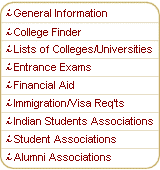Undergraduate Education
Let us begin by noting that virtually no financial assistance is available for international students for undergraduate studies. International students from other European Community (EC) countries may qualify for some form of limited assistance. For local students, competition for financial assistance is fierce.
Prospective undergraduate students will be well-advised to research financial aid opportunities with colleges of choice, various governmental agencies, and private institutions.
Graduate Education
For local students, various forms of scholarships, assistantships, tuition fee relief, and loan programs are available though colleges, government and private institutions. You should research financial aid opportunities with colleges of choice, various governmental agencies, and private institutions.
International students can obtain research and/or teaching assistantship for financial support. The availability of such assistantships is rather limited and, therefore, extremely competitive. Assistantships, however limited, are more readily available for engineering and computer science programs. International students are not eligible for loans or funding from governmental agencies.
Since many university professors have research grants, it might benefit the prospective graduate student to communicate directly with the professor who could or would supervise their dissertation/thesis. Dissertation/thesis supervisors can and do offer research assistantships from their research grant.
Cost of Education
Education is very expensive in the UK, at least as expensive as the US. Just the tuition runs from £3,000 to £21,000 per year, depending on the type and quality of the institution, as well as the type and quality of the program of studies. The cost of living will add another £6,000 to £10,000 per year, depending on the location.
On-campus accommodations are not necessarily cheaper than off-campus accommodations. Moreover, not all colleges offer on-campus accommodations. Your school will help you with both on-campus and off-campus accommodations.
Employment
There is little possibility of students working their way through College.
Students studying at UK institutions and who are not nationals of a European Economic Area (EEA) country are no longer required to obtain permission from the Jobcentre to take spare time and vacation work.
Similarly, they are able to do work placements which are part of a 'sandwich course' or to undertake internship placements without the need to obtain permission from the DfEE's (Department for Education and Employment) Overseas Labour Service.
This change took effect on 21 June 1999. It applies to all non-EEA national students whether they are currently working or due to start work after this date.
Under the new arrangements students will not need to obtain permission before they can work. The conditions covering the hours and type of work they may do, which remain unchanged are:
-
the student should not work for more than 20 hours per week during term time except where the placement is a necessary part of their studies with the agreement of the education institution;
- the student should not engage in business, self employment or the provision of services as a professional sportsperson or entertainer;
- the student should not pursue a career by filling a permanent full time vacancy.
This applies to people admitted to the UK as students for more than six months. Their passport stamp will continue to state that they can only work with permission from the Secretary of State for Employment. Under the new arrangement this approval, subject to the conditions above, is automatically deemed to have been given.
The above arrangements do not apply to students on courses of six months or less, who are landed on conditions which prohibit employment. However, if short-term students indicate that they want to take part-time work, the Immigration Officer will grant entry on the above conditions, assuming they meet the normal requirements of the student rules.
A Special Note for International Students
Do not assume that you can obtain financial assistance after arriving in the UK. Secure proper finances prior to departing for the UK. Do not believe stories that you can easily obtain financial assistance once you arrive. It can happen, but most likely outcome would be that of extreme disappointment. Do not play games with your life and money. As we all know, being optimistic is good, but being unrealistic is not.






